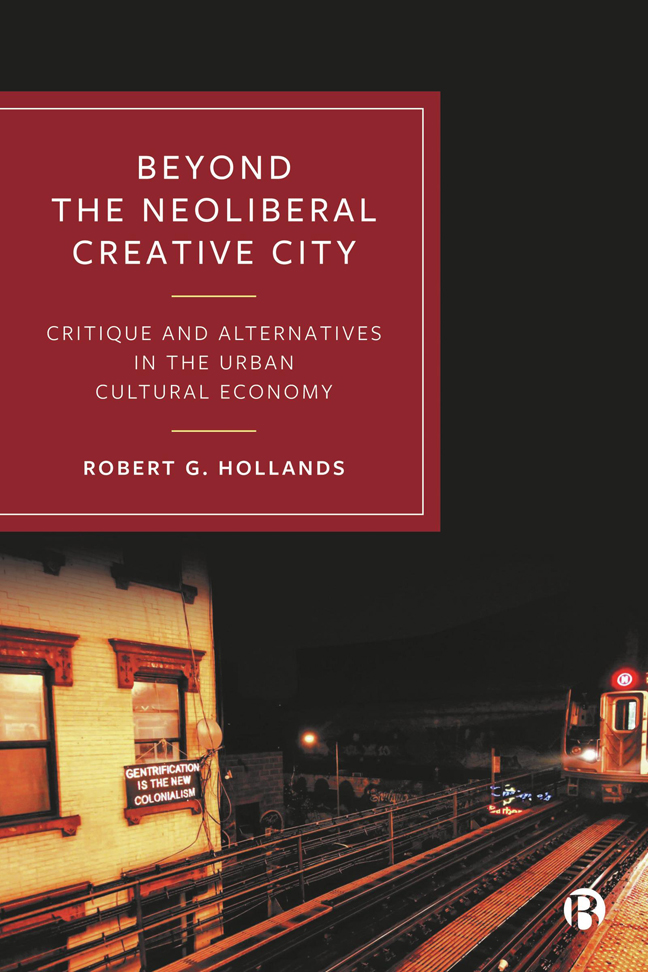Book contents
- Frontmatter
- Dedication
- Contents
- List of Figures, Tables and Case Studies
- About the Author
- Preface
- 1 Neoliberalism, Creativity and Cities
- 2 Urban Entrepreneurialism: The Emergence of the Cultural Economy
- 3 Critiquing the Neoliberal Creative City: But Long Live Alternative Creative Spaces!
- 4 Urban Cultural Movements and Anti-Creative Struggles
- 5 Neoliberal Nightlife and its Alternatives
- 6 Rethinking the Tourist City: Contestation and Alternative Cultural Tourism
- 7 Creative Polarization, Division and Exclusion
- 8 Beyond the Neoliberal Creative City
- Notes
- References
- Index
7 - Creative Polarization, Division and Exclusion
Published online by Cambridge University Press: 25 January 2024
- Frontmatter
- Dedication
- Contents
- List of Figures, Tables and Case Studies
- About the Author
- Preface
- 1 Neoliberalism, Creativity and Cities
- 2 Urban Entrepreneurialism: The Emergence of the Cultural Economy
- 3 Critiquing the Neoliberal Creative City: But Long Live Alternative Creative Spaces!
- 4 Urban Cultural Movements and Anti-Creative Struggles
- 5 Neoliberal Nightlife and its Alternatives
- 6 Rethinking the Tourist City: Contestation and Alternative Cultural Tourism
- 7 Creative Polarization, Division and Exclusion
- 8 Beyond the Neoliberal Creative City
- Notes
- References
- Index
Summary
Previous chapters have referred to how neoliberal urbanization and the creativity paradigm are implicated in the production of social and spatial inequalities. This chapter returns to a focus on the creative city and explores its role in contributing to urban polarization, division and exclusion. Florida's (2004) initial vision was that the creative class was going to transform the urban economy in a positive direction creating economic growth and increasing social tolerance. We now find ourselves in a ‘new urban crisis’ (Florida, 2018) characterized by ‘hyper-gentrification’, housing bubbles and a widening gap between the rich and poor. The argument made here is that the neoliberal creative city has, in fact, actively contributed to this crisis (Dorling, 2017).
This chapter is organized into four sections. First, it provides a wider context by looking at how neoliberal urbanization creates increased polarization between rich and poor (Shi and Dorling, 2020) while ideologically blaming the less well-off for their worsening situation. Second, it discusses how the creative class paradigm ‘maps onto’ urban divisions, hiding, extending and creating new social inequalities (Gerhard et al, 2017). It focuses on the negative impact the creative class has had on the service and working classes, as well as the urban poor. It also explores how the creative class concept itself hides significant divisions and inequalities within its own ranks. Third, I explore the process of ‘creative exclusions’ through the idea of seeing disadvantaged youth as either a ‘creative underclass’ or as ‘non-creative chavs’. The final section of the chapter concludes by briefly considering some alternative ways of tackling social polarization, creative divisions and exclusions.
Capitalism, neoliberalism and polarization
To preface the discussion of why the most successful neoliberal creative cities appear to be the most unequal (Florida, 2003b; 2018), it is important to examine the issue historically. Capitalism from its inception is a system based on inequality and polarization. Marx (1977) argued that it was based on a two-class model divided between the proletariat (workers) and the bourgeoise who owned the means of production. While he also recognized that capitalism produced a ‘sub-class’ of workers, Marx rather deterministically theorized that increasingly within capitalism people would be thrust into either of the two main classes.
- Type
- Chapter
- Information
- Beyond the Neoliberal Creative CityCritique and Alternatives in the Urban Cultural Economy, pp. 133 - 155Publisher: Bristol University PressPrint publication year: 2023



